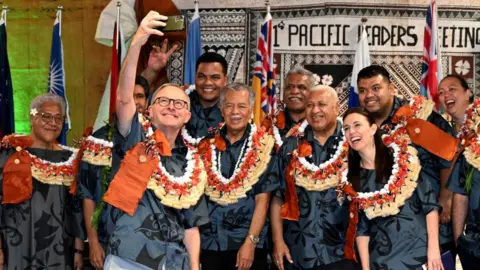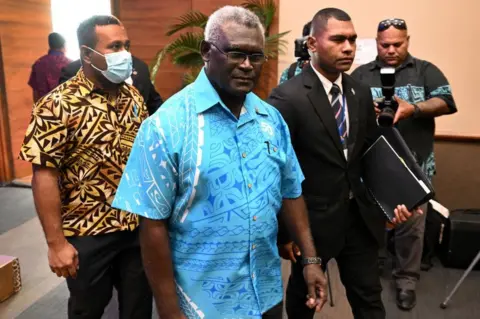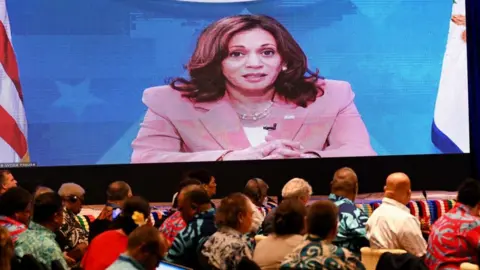Pacific Islands urge unity in face of China ambition
 Getty Images
Getty ImagesThe Pacific Islands Forum calls itself a family.
Fourteen islands scattered across the vast Pacific Ocean, along with Australia and New Zealand, connected by their natural environment, faith, culture and traditional knowledge.
Nowadays they also share challenges: a very real threat from rising sea levels, more frequent storms and economies crippled by Covid-19.
But the regional bloc's first face-to-face meeting in almost three years in Fiji's capital Suva didn't turn out to be the warm reunion many expected.
A day before the event began, Kiribati - one of the most isolated islands in the world - made a surprise announcement that it wouldn't attend the summit and quit the bloc altogether.
The China factor
The region's strategic location and need for assistance have triggered a battle for influence in the Pacific, with China keen on playing a prominent role.
In June Beijing proposed a sweeping trade and security deal with 10 countries in the region. But it was shelved after many of the countries declined to sign.
China did however host a separate political dialogue with Pacific Island countries at the same time as the PIF forum was taking place in Suva.
Allow X content?

Delegates including officials from Tonga, Niue, Vanuatu, Papua New Guinea, Micronesia and Kiribati attended the Chinese event in person. The Chinese embassy in Fiji noted that the Fijian defence minister joined by video.
Kiribati has moved closer to China after withdrawing diplomatic recognition from Taiwan in 2019. (Beijing considers Taiwan to be a part of China and says it should unite with the Chinese mainland, while Taiwan sees itself an independent country.)
Even before the pandemic Kiribati had high levels of debt and needed funding.
 AFP
AFPChina has also had a presence in Fiji for generations. But in the last 10 years, it has been investing heavily - in infrastructure and fishing - and has become a major trading partner with all of the Pacific Islands.
What used to be a purely economic relationship has now become much deeper, crossing into areas such as law, agriculture, services and also security.
In April the Solomon Islands signed a security pact with Beijing. This week's meeting in Suva was the first time Solomon PM Manasseh Sogavare had met his PIF counterparts since then.
"We are family and there are many issues, and that makes family stronger," Mr Sogavare said after hugging Australia's Prime Minister Anthony Albanese.
The big concern was around the potential for China to establish a Chinese military base in the South Pacific, something Mr Sogavare has now said he would not allow.
"The moment we establish a foreign military base we immediately become an enemy [of the Pacific]," he told RNZ in an exclusive interview.
Asked about Mr Sogavare's comments, Chinese foreign ministry spokesman, Wang Wenbin said the South Pacific should be a "platform for cooperation, rather than a battleground for malicious competition".
Mr Albanese called the meeting with Mr Sogavare "very constructive" and told Australian media that he was confident that a Chinese military base "won't happen".
A geopolitical tug-of-war
But China is not the only country increasing its presence in the Pacific.
Beijing's actions have revitalised the interest of other stakeholders who have long been absent from the region's geopolitics - such as the US.
US Vice President Kamala Harris addressed the forum, announcing two new embassies in Kiribati and the Solomon Islands. She also tripled current aid levels to help combat illegal fishing, enhance maritime security and tackle climate change, after decades of stalled funding.
 Getty Images
Getty ImagesMeanwhile Australia said it had made defence commitments that would create jobs and protect fishing industries.
Window of opportunity on climate
But the greatest security threat for forum members continues to be climate change and the PIF declared a climate emergency in the region for the first time.
It is largely a symbolic move, but leaders emphasised that the crisis "threatens livelihoods, security and wellbeing of its people and ecosystems". It also puts the issue front and centre in future policy decisions.
"We've got 14 cyclones since 2016, the cyclone in 2016 wiped out one third of the value of our GDP in 36 hours. It's a huge impact," said Aiyaz Sayed-Khaiyum, Fiji's economy and climate change minister.
Sarina Theys, a lecturer in diplomacy at the University of the South Pacific in Suva, told the BBC that Pacific nations should use the renewed international focus on the region's security arrangements as leverage for more climate action.
"I do think that there is a window of opportunity for Pacific Island countries to use the current situation to get things done regarding climate change, and to get it done from other actors who are important, because they are major polluters," Ms Theys said, referring to the US, Australia and China.
The Forum chair and Fijian Prime Minister singled out Australia - asking Prime Minister Anthony Albanese to commit to limiting global warming to 1.5 degrees and ending its "fossil fuel addiction".
Allow X content?

Regional unity and solidarity remain a priority for Pacific Island nations - but they also have decisions to make about which outside powers will be allowed a stake in their region's future, and on what terms.
Additional reporting by Christine Hah
